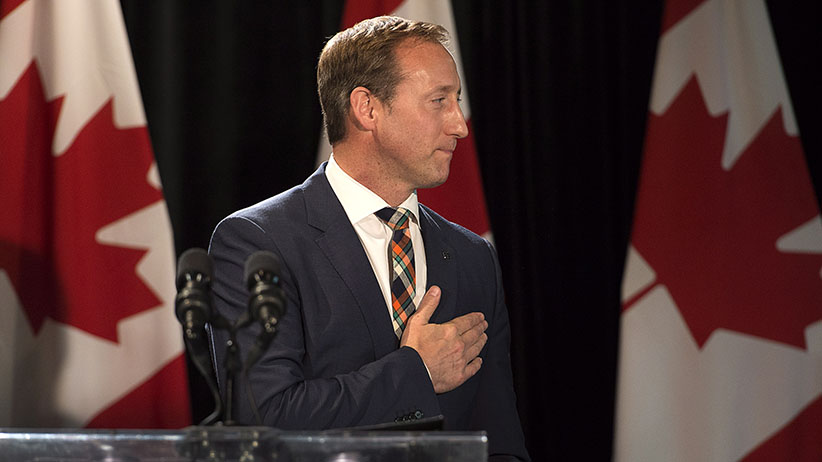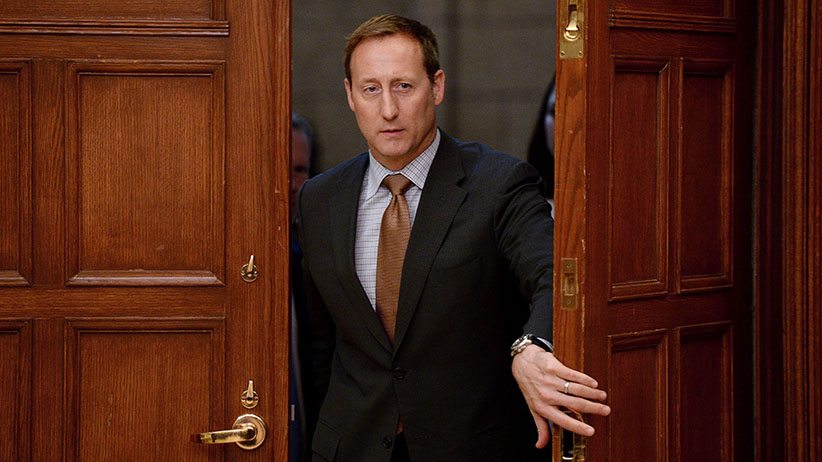Peter MacKay leaves politics: a roundtable discussion
Our Ottawa bureau parses MacKay’s exit speech, and the Prime Minister’s farewell
Federal Justice Minister Peter MacKay announces his resignation in Stellarton, N.S on Friday, May 29, 2015. MacKay, the MP from the riding of Central Nova, was first elected in 1997. THE CANADIAN PRESS/Andrew Vaughan
Share

Justice Minister Peter MacKay announced his intention not to run the next election in Stellarton, N.S., a town within the boundaries of his Central Nova riding. MacKay and his father, Elmer, combined to represent Stellarton’s residents for most of four decades, and the Maclean’s Ottawa bureau gathered to dissect the younger MacKay’s announcement—which featured a guest speaker, Prime Minister Stephen Harper.
THE ROUNDTABLE
PAUL WELLS: When the statements by Stephen Harper and Peter MacKay began in Stellarton, today was a lousy day for the Conservative Party: A senior cabinet minister, ambassador for a legacy wing of the modern party, was quitting. On a day when it was announced that Canada’s economy shrunk in Q1 2015, the worst quarter our economy has had since the 2008-09 recession.
But didn’t the Conservative Party’s two founding members come close to erasing all that gloom in less than a half hour? The PM’s jokey, sentimental opening statement—interrupted by young Kian MacKay’s chatter, and by Harper’s own anecdotes about fatherhood—and then MacKay’s down-home, near-tearful statement. Basically everything in federal politics since last September has been a campaign event. Maybe I shouldn’t be surprised that this turned into one, too.
JOHN GEDDES: MacKay spoke about as I would have expected, very well in an old-school manner. But the Prime Minister surprised me. As he got going, I was thinking, This reminds me of someone. Then I realized: He reminded me of Stephen Harper from his NCC and opposition days. Back then, he often gave his speeches a little narrative thread, a story of some sort.
And for today, that thread had to do with family. The PM focused on MacKay’s, but I was thinking about how Harper, back in 1998, spoke of how the birth of his son softened the edges of his politics. So I think he genuinely has a feel for how fatherhood intersects with political life. Thinking about the audience, he has to know, too, how that sort of message dovetails nicely with middle-class-family-friendly election positioning.
So, all in all, I think a deft outing, linking the story of the new Conservative party’s founding with its current campaign messaging.
Related at macleans.ca:
WELLS: Exit Peter MacKay, stage centre-right
WHERRY: Peter MacKay and the waning Progressive Conservatives
GEDDES: The political battle wounds of Peter MacKay
KINGSTON: Peter MacKay’s private life on the public stage
PAUL: But enough praise. MacKay’s departure, structurally, is like the thing where a bumblebee loses its stinger and half its abdomen after delivering a sting. As a rule, the bee doesn’t survive. MacKay’s taking a chunk of the party’s structural integrity with him, only five months from a crucial election that was already going to be difficult to win.
However artfully executed, the PM’s appearance tonight was an exercise in damage control.
It was also even more frank than it seemed, for anyone familiar with some of the back stories behind the anecdotes. Harper said the 2003 merger negotiations were “frankly” more difficult for MacKay than they had been for him, Harper. I’ll say: Partly because the accumulated weight of a century’s history made the PCs a harder brand to sacrifice than the green and battle-scarred Canadian Alliance would ever have been. But also because during those negotiations, Harper went up one side of MacKay and down the other, leaking against him strategically, organizing members of MacKay’s own party against the PC leader to constrain his options. While it was happening, MacKay looked like he’d been hit with sticks. The intervening 12 years seem to have allowed both of them to get past that memory, but it was a striking moment when Harper made even a passing reference to that difficult summer.

AARON WHERRY: I’m fascinated by the entire idea of the Progressive Conservative party at this point. I got into it a little bit in my piece, but if I had a week to think about it I’d want to figure out what the PC party actually was, ideologically, and whether distance has made people think differently of it.
A politician’s farewell speech is almost always difficult to engage with. They always suddenly seem so… human. Imagine if McKay’s speech had been followed by questions from reporters. “Sir, that was a lovely speech, but what about the F-35?” I thought it was a bit funny that he cast “change” as a part of politics (possibly not the idea the government would like to promote) and that he relayed his father’s quip about never locking a door (so go ahead and keep speculating about a possible leadership run) and that he used a baseball analogy. My gratitude and admiration for any Canadian politician who uses a sports metaphor that isn’t something to do with hockey.
I’ll presume this will all soothe any fussing about a split or divide in the Conservative party, but I do wonder how much chin-stroking there’ll still be about what this says about the party and the government.
JOHN: I’m with you on how MacKay’s Progressive Conservative allusions made me sit up and listen. There was his double-barrelled thank-you—to both the Conservative Party of Canada (that’s the current brand) and the Progressive Conservative Party (the defunct strain). Perhaps the PCs are long enough dead by now that invoking the name is no more threatening than a hockey team donning the legacy jersey from the franchise’s olden-times heyday.
Perhaps more substantially, MacKay lapsed into the style of an earlier era now and then. I’m thinking of when he very directly took credit on behalf of Conservative governments of the past for building bridges and buildings in Atlantic Canada, and basically promised more for as long as Tories keep getting elected. Of course, boasting of infrastructure spending remains a blunt instrument of incumbency politicking in Canada, but generally big-league politicians are a little circumspect sending that message.
It reminded me that Donald Savoie, the famous New Brunswick author on government (who also happens to be an old friend of MacKay’s politician father) regards Peter MacKay as a “regional minister” in the classic mode.
AARON: Michael Chong, who ran for the Progressive Conservatives before he was elected as a Conservative MP, pointed out something to me that probably needs pointing out: “There would have been no Conservative government without Peter MacKay.”
That’s rather a big deal: you changed the history of the country.
As I type, he’s back on television, now taking questions from reporters. He can’t speculate on his future, apparently. Might as well leave that door unlocked, I suppose. And now he gets to sit back, hang out with his family and see what happens. Which reminds me: the post-Harper future of the Conservative party is going to be very interesting. I would agree with Paul that the party won’t collapse. But it’ll be fun to see who leads it and where it goes.